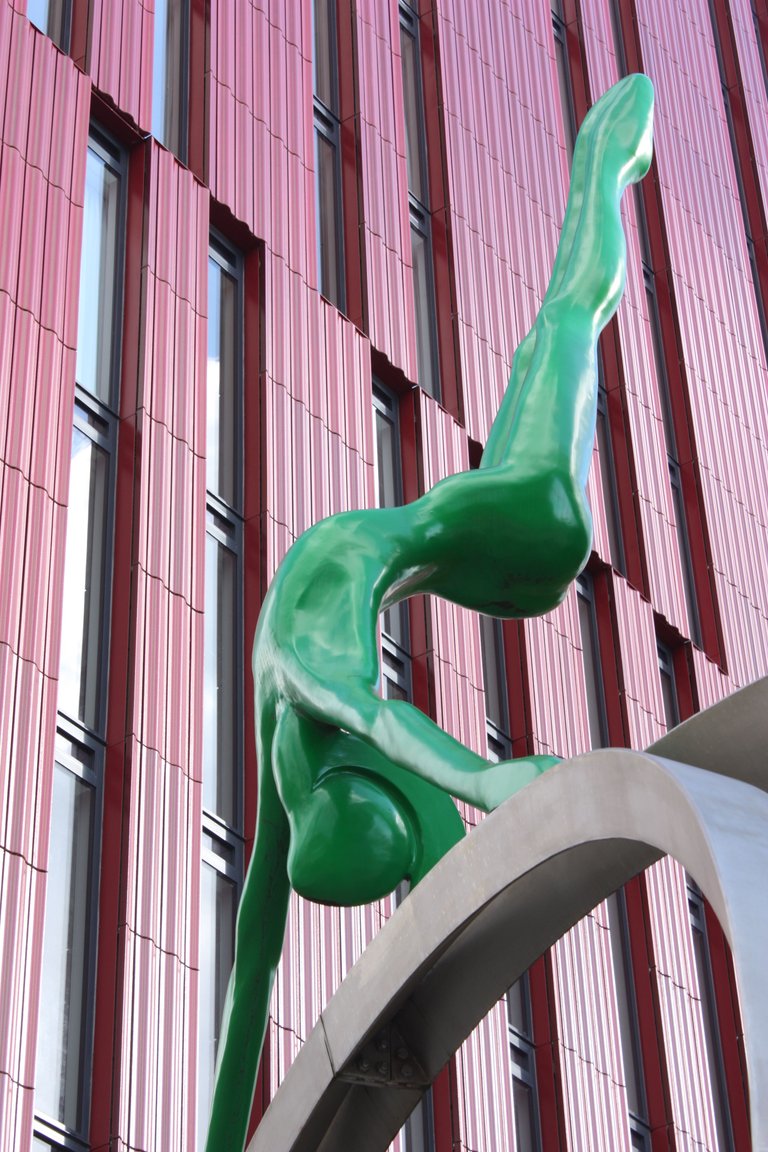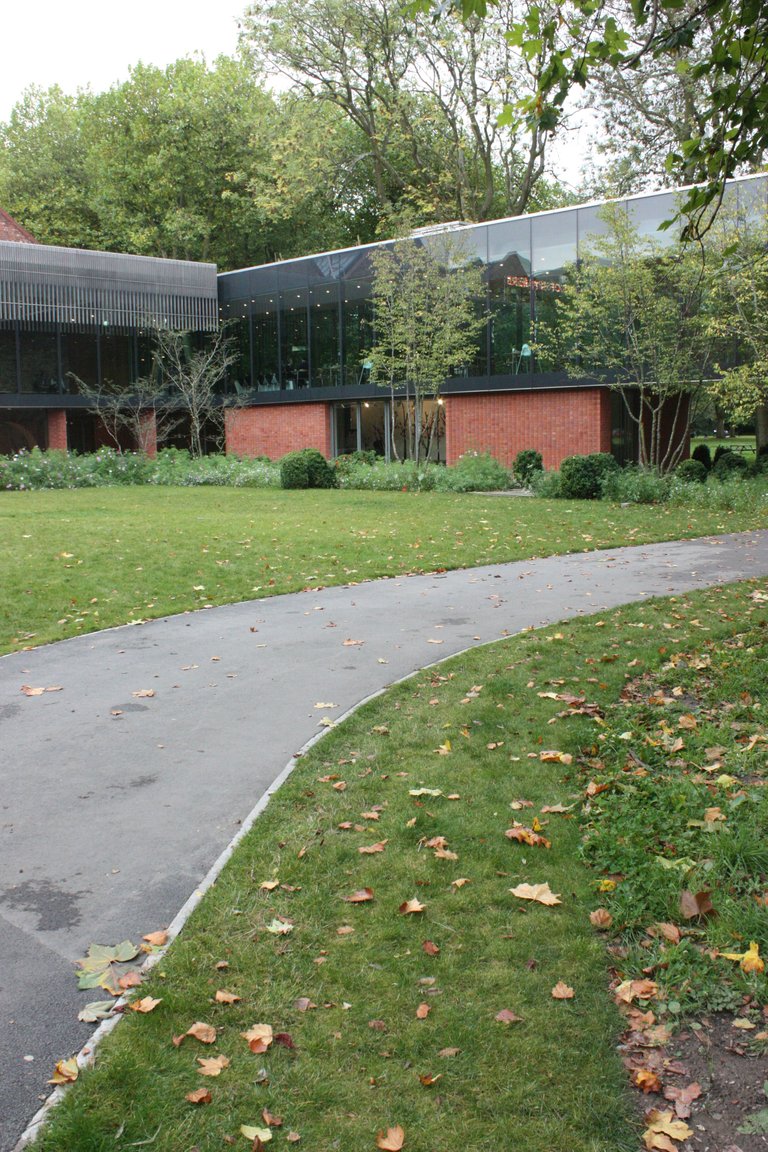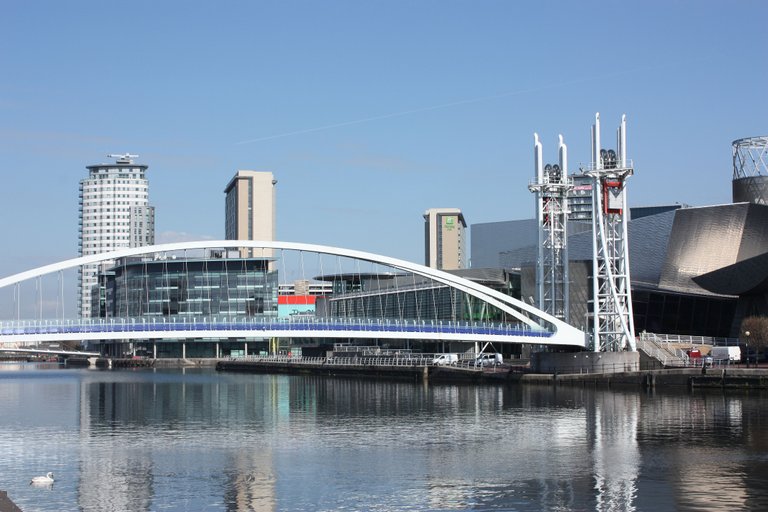
The Home Arts Centre on First Street in Manchester is a merger of the Cornerhouse cinemas and art gallery and the Library theatre. It is a new centre for contemporary art, theatre, and film and is the biggest arts complex of its kind in the UK, outside London. Home is roughly equidistant from Deansgate and Oxford Road stations and is situated just off the pedestrianised First Street, where visitors will find five brightly coloured acrobat statues in dramatic poses. I was told these statues cost the city 150,000 pounds.
Home seemed to have a good selection of films for a variety of interests, but I was there to see a production called ‘Golem’ put on by the 19:27 Theatre company. It was a theatrical event. I call it an event because Golem is not a play; Golem combined animation with live music and live performances by the actors. Golem was entrancing and I can’t recall becoming so lost in a production and marvelling so much at what my eyes are showing me. The story concerns what happens to people when technology gradually takes over their lives until dependency on the technology becomes their way of life. The original, larger Golem does the hoovering when you are asleep and then watches the TV. The Golem 2 is smaller, but does the work ten times faster and also makes suggestions as to how he can improve your life. And then there is the Golem 3... Before this tour de force, I ate a superb dinner in the Home restaurant accompanied by a beautifully kept pint of Timothy Taylor’s Landlord bitter.
I was hungry because earlier in the day I had walked from the city centre to the Whitworth Art Gallery within the campus of the University of Manchester. It was Fresher’s Week, the buses were packed, and the streets were full of young people from around the world starting their student days by getting to know their classmates in the weak, autumnal sunshine. The Whitworth won the Museum of the Year Award in 2015 and there is no entrance fee to see the collection of 55,000 items. The art has a broad reach ranging from William Blake and JMW Turner via Lucian Freud to an embroidery of the Wikipedia entry for Magna Carta, mainly embroidered by prisoners. The Whitworth has eight paintings by Blake and the most famous is entitled ‘The Ancient of Days’, originally published as the frontispiece to a 1794 work, Europe.
The seventeen Turners cover the 50-year period between 1794 and 1845. One of the earliest is a landscape of Llangollen in Denbighshire. The town in the valley occupies perhaps the bottom quarter of the painting with the rest taken up by dramatic hills and a light sky. But the detail in that bottom quarter, of the church in Llangollen, of the people on a bluff between the painter and the town, and of the bridge over the river has a draughtsman-like precision in every respect. I would contrast this style with a painting entitled ‘Sunset on Wet Sand’ from 1845, which looks like the work of an Impressionist. It’s fascinating to see the change in an artist’s style over their lifetime. When I see some of Turner’s later work, I can’t understand why he’s not considered to be the first of the Impressionist painters.
The Art Gallery is in Whitworth Park and there are nearly a dozen outdoor artistic works to behold. This park also allows visitors to see the new steel and glass wings of the latest expansion of the gallery. The pattern of bricks in the new extensions reflect an historic textile found in the gallery’s collection. The lightness and airiness of the extensions contrasts sharply with the red-brick solidity and stolidity of the front entrance of the gallery, which made me feel like I was going back to school when I entered. I think the idea is that as I move through the gallery from old to new, the architecture gradually prepares me for going back into the park, back into the natural light of the day, back into the outside world.
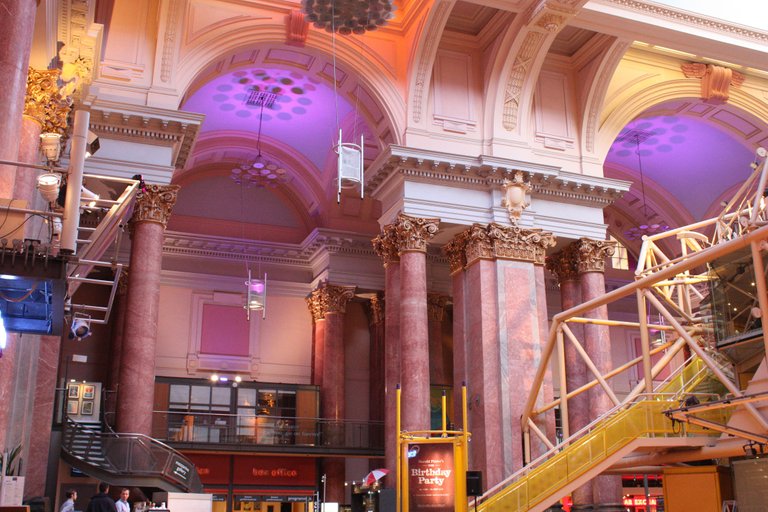
The Royal Exchange Theatre is situated in the Old Cotton Exchange in the centre of Manchester and is another example of old and new occupying the same space in the city. This in-the-round theatre, with seating on three levels, puts on excellent plays and I saw ‘The Crucible’ there on my most recent visit, sitting in my favourite place in the front row on the second level. Most of the centre of Manchester was being dug up to accommodate yet another Metrolink line, so I had to walk to Piccadilly Gardens to catch the tram to Salford Quays. This line passes the squat, old G-Mex centre and the tall, modern Hilton hotel before running along the canal to Cornbrook and heading towards Eccles.
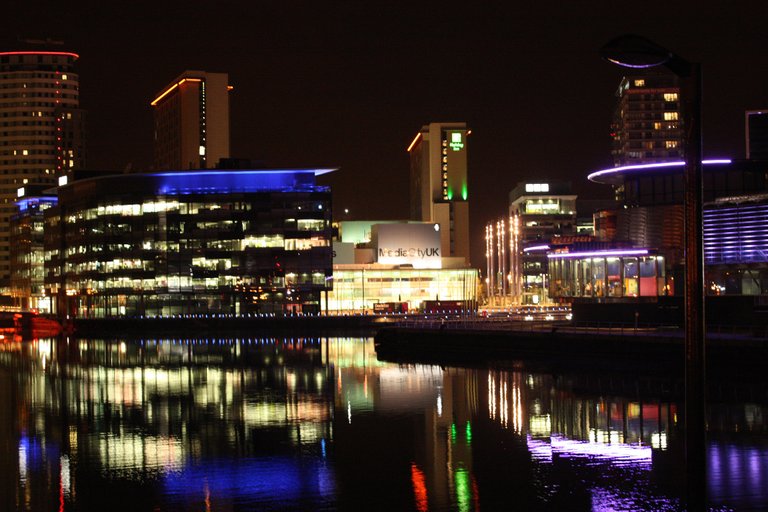
Salford Quays is the home of the BBC in the North of England, Coronation Street, the Lowry Centre and Art Gallery, Manchester United, the Imperial War Museum of the North, and an outlet shopping mall. Something for everyone. Rowers use the old docks for practising their techniques though swimming is not allowed in the water, which needs constant aerating. If only something humane could be done with the Canada Geese then Salford Quays would be a wonderful destination as the modern buildings all look good and show what urban renewal can do to gentrify a rundown area, at least to the benefit of the better off in society. As if to illustrate this, as I was driving away after my visit on an otherwise quiet Friday morning, I had to make a slight diversion as a Maserati had knocked off the rear end of a Porsche 944. The drivers looked as though they had stepped off a catwalk in Milan and were calmly talking to the police as if nothing had happened.
I didn’t have to use my car at all during my visit. The Metrolink system now covers a large section of Greater Manchester covering the Airport, Altrincham, Bury, Eccles, Rochdale, Oldham, and Ashton-under -Lyne. I suppose a line could link Piccadilly Gardens with Manchester University and the Whitworth Art Gallery, but most other directions are covered. Metrolink also connects with the stations where visitors can catch trains to Wigan and Bolton. After 9:30 am there’s a daypass, costing 5 pounds, which allows unlimited travel on the entire Metrolink system for the whole day.
